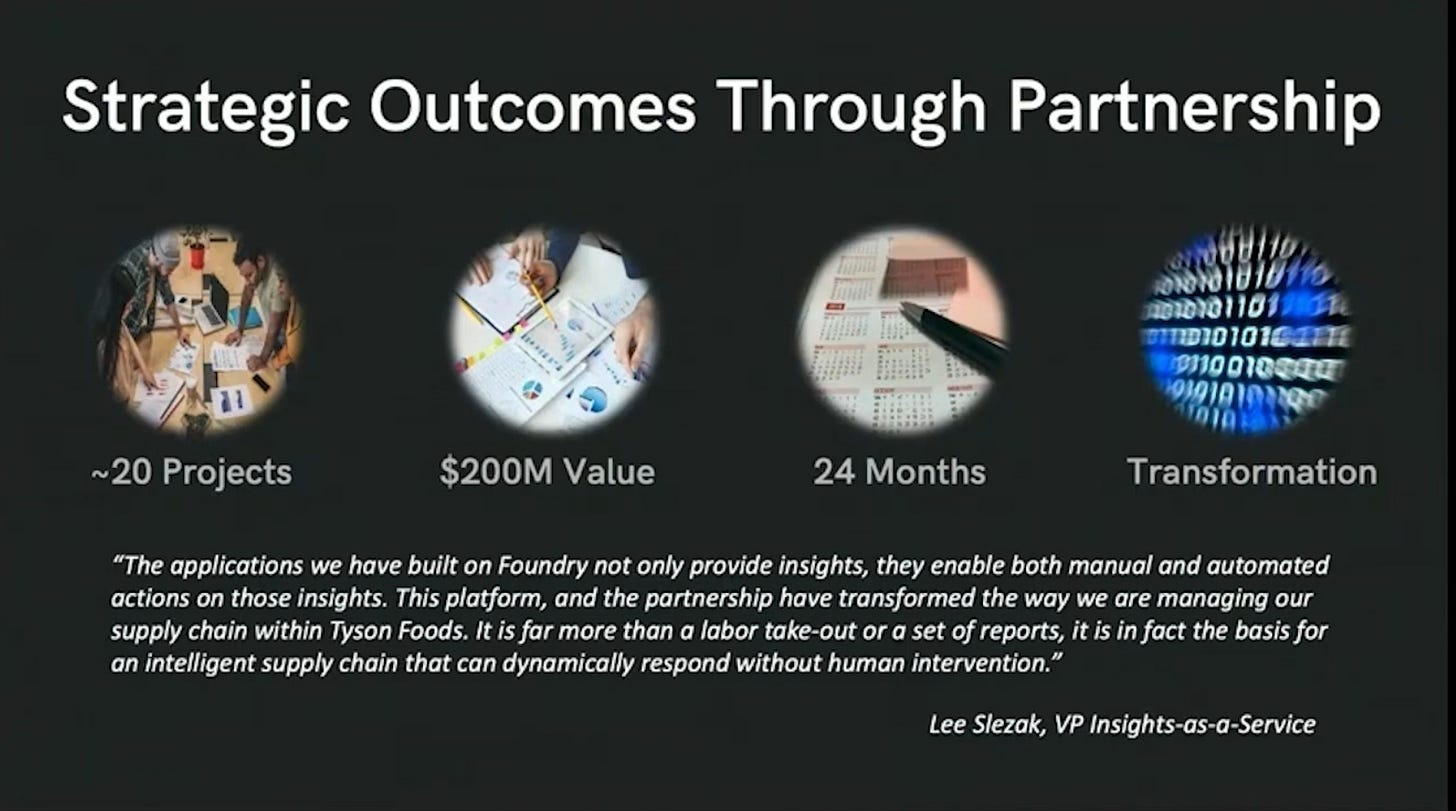A New Frontier for Palantir
Europe desperately needs good software. They can't build what they need without Palantir, but do they know that?
Palantir has successfully achieved what we all wanted ever since they DPO’d and we started buying, some 4 years ago. Both Palantirians and us investors have endured years of intense and unfair criticism, motivated primarily by a savagely politicized press full of lies, covered by a false story of ‘necessary scrutiny’.
We now are in the place we imagined was the rightful one for the company. The respect Palantir now gets from the media, the (finally good) attention Dr. Karp receives and a constant influx of contracts arriving from both the public and the private sectors validate my point, Palantir now rhymes with victory.
Still, critics remain active and skeptics keep repeating the same topics from 4 years ago; What does Palantir do? or How are they any different than a consulting company?
Let’s begin with how Palantir specifically helped their customers and partners. What specifics can be found in these companies applying Foundry to their needs? It‘s a clean, straightforward answer that everyone in every single industry comprehends: dollars saved. Or, as Chad Wahlquist once famously wrote, they ‘GSD’.
There’s an example that the retail investor community loves to bring up every time someone asks “but what does Palantir do?”, and that is the Tyson Foods case.
I still think the presentation that Scott Spradley (Tyson Food’s CTO at the time) gave is the best exposition on Foundry I have ever seen. He showed what Palantir’s software allowed them to save, in dollars, and the numbers left everyone in the audience, and at home watching, astonished. $200M in value generated, against just $6M spent annually for using Foundry. That’s what Palantir does.
From having only 46% of their trucks at maximum capacity to over 87%. That’s what Palantir does.
$100M in annual savings for better managing inventory. Again, that’s what Palantir does.
There’s a mission that correctly penetrates the American mindset, because it’s a practical one. The Europeans need to understand Palantir… Right? Do they? Do we?
It’s no longer a matter of time, nor a probable eventuality that will slap our faces, it’s a definite reality. The cost of not adapting is just too high.
The widely slow pace of innovation in Europe has forced skeptics of American technology to adopt their tools, and on top of this, there’s simply no competition. Not too long ago, Dr. Karp said something in the lines of “Our competition are the customers trying to develop their own solution”, referencing some cases where companies like Coca-Cola chose to come up with their own product, or more notably the US government, as well as some European countries. Some already came back, and there’s no reason to believe the others wouldn’t… Or is there?
Germany had some troubles with their police adoption of Gotham, under the name of VeRa, a platform built on top of the original Palantir software. Someone must have tried really hard to prevent them from doing business in, and ultimately help, Germany. Why? Who funds all these people?
Great Britain, although not the perfect European example, mainly because of their own political system (outside of the European Union and its bodies of bureaucracy), also had complications with Palantir entering the British market. You might remember a long, intense battle of propaganda and lies, investigation and political stalemate that finally ended with a victorious Palantir and a defeated fake news campaign. Palantir won, and the NHS saved lives.
All those ‘NGOs’ accounts spreading nonsense and immaterial accusations that were funded by the same organization… It was really a sloppy job. Those events were part of a smaller coordinated attempt compared to what could happen sometime in the near future. Those defeated but powerful people won’t forget, and their interests possibly remain unaltered, though means will change.
In my view, Palantir needs to prepare for a new cultural war that will inevitably unfold against their name, that will come from Europe. The fact that a low percentage of Europeans are aware of a company called Palantir should be read as a big opportunity, and I think the company knows. First impressions matter, and we can’t allow an evil force to implant such destructive and deceptive perceptions into the average European brain. The main point is the following; should Palantir do anything about it? Should they promote themselves in big media ads in Europe, just as they did on The New York Times?
We in the investor community like these efforts, and we want more of them. We even collect the paper editions! But the main question I have, as many others probably do, is if there’s an effort that could be pursued like that in Europe. And if it’s worth it, why not go for it?
You might remember Dr. Karp and the rest of the leadership at the company had expressed frustration in the performance of their investments made in the European market. I think they made a big bet, and the results were simply not there. I remember that during some quarters, especially during 2022, the numbers were generally sluggish, mainly because the spectacular growth in America was dragged down by poor performance in Europe.
And we all wondered ‘but why?’. The product is literally saving businesses in America, why won’t they adopt it in Europe? Simply put, because Europeans are not realizing that the future is now, that Europe has too much bureaucracy, too many pages full of small print and a sense of pride that should stick to culture, and not spill over business.
Don’t get me wrong, Palantir is expanding in Europe and we see it with more companies using AIP and Foundry every quarter. But they could benefit from a positive atmosphere of change, of growth and of exciting, lifesaving tools. There’s also the threat of new campaigns that will defame and attack the company.
I believe the community can play a big role in preparing the minds of European citizens to anticipate and be more suited to understand what the company is, and most of all what they do. It’s also true that the way of understanding business is not the same as in the United States or even in the UK, for example. The role of the state and the obligations and liberties of every individual are also concepts with different meanings, depending on which country you live in. We will see how this turns out. It will be an exciting journey nonetheless, just as these past 4 years have proven to be.




